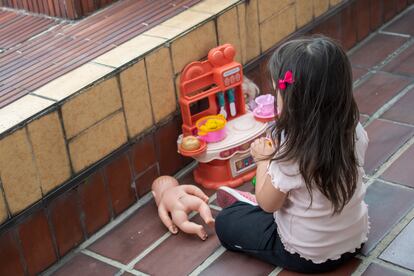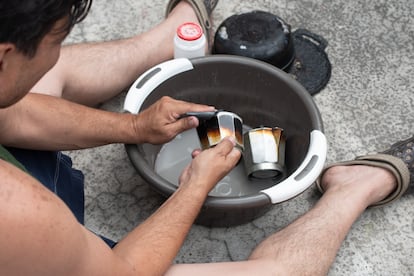‘I don’t want my children to go through what I’ve been through to get here’: The odyssey of reuniting the families of migrants and refugees in Ecuador
In one of Latin America’s chief host countries for migrants and refugees, foreigners must contend with bureaucracy and job insecurity as they dream of being reunited with their relatives

Looking out of the window of a house that doesn’t belong to her, Ana gazes at a country that isn’t her own. Outside, her three-year-old daughter is playing. “Mee-Maw, your soup’s ready,” the girl calls out. Ana explains: “She has only met her grandparents on video calls, so she pretends that I’m her mee-maw.” They haven’t seen the rest of their family for five years.
Situations like Ana’s are commonplace among people who have been forced to flee to Ecuador: obtaining legal residency and bringing their families back together are mammoth challenges. According to the UNHCR, the United Nations’ refugee agency, the country is host to around 550,000 refugees and migrants, a total that represents some 3% of Ecuador’s population of 18 million. “Between getting legal residency and managing to bring your family over, you may be waiting for a number of years,” Ana says. “And it’s difficult to get the money you need [to complete the process]. People take advantage of you, too — there’s a lot of misinformation out there about how to go about it.”
Ana, Luis and Yulitza, whose real names have not been used to protect their identities, are among Ecuador’s 3%. Ana is Cuban. She arrived in Ecuador in 2018. After going through a long process, she secured legal residency and now works as a publicist. Luis is Venezuelan. He has been in Ecuador for four years. After the Ecuadorian government’s approval in June of a migratory amnesty for Venezuelans who entered the country illegally, he has been able to begin the process of seeking the right to stay. Yulitza is Colombian. Two years after she arrived in Ecuador, she was given refugee status, but finding work has been difficult. Like Luis, she does odd jobs to support her family.
Ana, Luis and Yulitza’s stories, home countries and reasons for leaving are different. But what they all have in common is a desire to see their families again. Luis left behind a two-year-old son and a pregnant wife. Four years on, he still hasn’t met the daughter that was born after his departure. It’s more than seven years since Yulitza last saw her mother, who, in turn, is yet to meet her youngest grandchildren.
Luis: “Not that easy to get a job even if you have a visa”
Luis is one of the almost 8 million Venezuelans that have left the country in search of a new life. And, although he believed that leaving his native land would allow him to provide his loved ones with a brighter future, he has found many obstacles blocking the path to this goal.
“From the moment I arrived in Ecuador, it was clear that it wasn’t going to be easy,” he says. “Being far away from your family, being unable to share your day-to-day with your kids…” Not having a stable job is also difficult, as is the threat of simply not being paid. That’s something that has happened to Luis. “If they don’t pay me… what can I do?” he says. “Who can I go and complain to?”

More than 475,000 Venezuelan refugees and migrants live in Ecuador, according to figures compiled by the Ecuadorian Taskforce for Refugees and Migrants (GTRM) in September. Only Colombia, Peru and Brazil house a higher expatriate Venezuelan population, the GTRM says.
Luis is the sole breadwinner for his family back in Venezuela. His income not only has to cover his expenses in the Ecuadorian capital of Quito, where he rents a room; he also needs to set enough money aside to send home. During his first six months in Ecuador, he benefited from a food-aid scheme. He also received support during the Covid-19 pandemic, the toughest period of his time in Ecuador.
“I haven’t brought my wife and my kids over, because I don’t want them to go through what I’ve been through to get here,” Luis says. “I came on foot, with a group of other Venezuelans. I’d like them to come here with a visa — and, above all, I’d like to have a steady income so that I can put the right conditions in place before bringing them over. It’s not that easy to get a job even if you have a visa. Imagine what it’s like if you’re here illegally.”
In June 2022, Ecuador issued a decree that made a temporary residence visa available to Venezuelan citizens and their family members. Following the approval of the migratory amnesty a year on, people who entered the country illegally, like Luis, are able to apply for this permit. It’s a ray of hope for Luis in his bid to meet his daughter and once more hug his wife and son.
Yulitza: An uncertain future
Although a while has now passed since Yulitza arrived in Ecuador from Colombia, she still remembers the violent circumstances that brought her here — circumstances she prefers not to go into — “as if they were yesterday.”
Violence has had a profound impact on the lives of Colombians. According to a report published last year by Colombia’s Truth Commission, there were at least 450,664 homicides in the country between 1985 and 2018, as a result of the Colombian internal armed conflict. However, the report’s authors say the true figure could be as high as 800,000. What’s more, there were 121,768 enforced disappearances; 55,770 were kidnapped; and around 7.7 million Colombians — including Yulitza — were forcibly displaced.
As Colombia and Ecuador share a border, the latter has become the chief destination for Colombians leaving their home country. Per the UNHCR, Ecuador housed a little over 75,000 refugees as of November 2023 — one of the highest figures in the region. Some 95% were Colombian.
“For me, the toughest thing has been juggling looking after my kids with making ends meet,” says Yulitza, who has four children and, back in Colombia, got childcare help from her mother and aunts. “I’ve had to take the kids out with me and look for a way to get by.” She receives financial and food support from several NGOs, but it isn’t enough. “I’m grateful for that, of course,” she explains. “But if I’m honest, what I really need is someone to take care of my kids so I can go out and work. I’m on my own. Sometimes my older kids watch the little ones for me so I can get out and do something — clean a house or sell things.”
Asked why she hasn’t yet been able to reunite with her family, she replies: “We’ve tried. We all had to leave the place where we lived, and everyone ended up in different locations. It hasn’t been easy to stay in touch, either.”
Ana’s “uphill battle” to see her son again
Between mid-2008 and December 2015, the open-doors policy in force at the time in Ecuador gave Cubans a pathway to leave their country and continue on to the United States. However, more than 2,000 people from Cuba — including Ana — have also found an opportunity for a new start on Ecuadorian soil.
But Cubans in Ecuador haven’t been free of the difficulties of reuniting with their families, either — a problem accentuated by their island of origin. “The damn circumstance of water everywhere,” says Ana, quoting the Cuban playwright Virgilio Piñera. “Either people get a visa, or they have to travel to one of the few countries that offer visa-free access to Cubans, and from there you take the risk and go up against all the obstacles of getting to your destination illegally.”
The obstacles that Cubans like Ana face when bringing family over also mount up inside Ecuador. “First, you have to obtain legal residency,” she says. “That’s an uphill battle if, for whatever reason, you’re undocumented when you arrive here, as was my case. It took me three years to sort it out. Then, even if it’s your own young child that you want to bring to Ecuador under your protection, you have to fulfil a series of requirements. Meeting all those requirements is very difficult, particularly the financial ones… And then there’s the problem of dealing with bureaucracy. For example, from April 2022 to March 2022, the webpage for applying for an appointment to get the visa you need from the Ecuadorian consulate in Havana was out of service. Almost a year without access to a simple procedure.”
Refugees and migrants in Ecuador must also clear the hurdle of unemployment and job insecurity, problems which the country is beset by. More than 60% of people in employment are paid below the minimum wage, according to Ecuador’s National Institute of Statistics and Census. In such circumstances, meeting basic financial needs and saving for the costs of going through immigration procedures becomes a colossal task.
As she looks out of the window, Ana thinks about her son in Cuba, and her eagerness to wrap her arms around him in a hug after five years apart. “Mee-maw, come and have your soup, please,” we hear from outside.
Sign up for our weekly newsletter to get more English-language news coverage from EL PAÍS USA Edition
Tu suscripción se está usando en otro dispositivo
¿Quieres añadir otro usuario a tu suscripción?
Si continúas leyendo en este dispositivo, no se podrá leer en el otro.
FlechaTu suscripción se está usando en otro dispositivo y solo puedes acceder a EL PAÍS desde un dispositivo a la vez.
Si quieres compartir tu cuenta, cambia tu suscripción a la modalidad Premium, así podrás añadir otro usuario. Cada uno accederá con su propia cuenta de email, lo que os permitirá personalizar vuestra experiencia en EL PAÍS.
¿Tienes una suscripción de empresa? Accede aquí para contratar más cuentas.
En el caso de no saber quién está usando tu cuenta, te recomendamos cambiar tu contraseña aquí.
Si decides continuar compartiendo tu cuenta, este mensaje se mostrará en tu dispositivo y en el de la otra persona que está usando tu cuenta de forma indefinida, afectando a tu experiencia de lectura. Puedes consultar aquí los términos y condiciones de la suscripción digital.








































